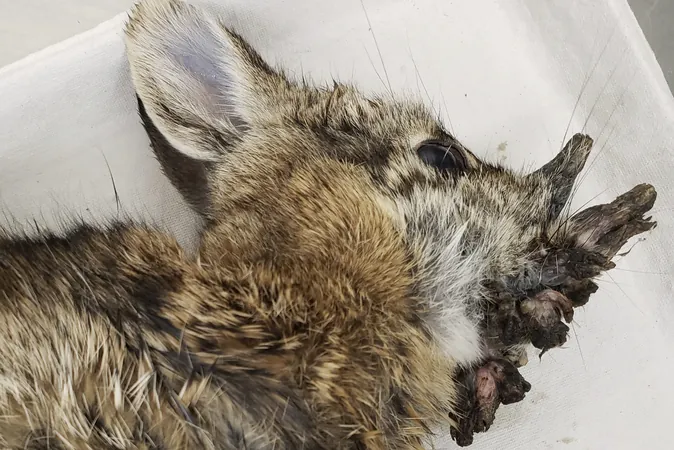
Strange 'Frankenstein' Rabbits Spotted in Wisconsin—Are They Mutants or Just Misunderstood?
2025-08-30
Author: Ying
Bizarre Bunny Sightings Ignite Online Buzz
In a peculiar turn of events, rabbits with horn-like growths sprouting from their heads have been spotted in northern Wisconsin, capturing the internet's imagination and sparking theories about these so-called "mutant" creatures. Known affectionately as 'Frankenstein' bunnies, these curious critters have drawn significant attention after photos surfaced from Colorado, causing a social media frenzy.
The Science Behind the Strange
Despite their eerie appearance, these rabbits aren’t necessarily the harbingers of doom that some might think. Nancy Businga, a wildlife disease specialist with the Wisconsin Department of Natural Resources (DNR), revealed that these unusual growths are caused by the Shope papillomavirus—a condition that, while strange, isn't apocalyptic. "Every year, we see a few reports of these rabbits with wart-like lesions," Businga explains.
Increase in Rabbit Sightings This Year
This year's reports suggest a notable rise in sightings, particularly in northwestern Wisconsin, where the DNR has documented eight reports involving 23 rabbits. This is a dramatic increase from only a single report in the previous year, raising eyebrows and concerns among experts.
Understanding the Virus
Paul Lambert, a professor specializing in oncology at the University of Wisconsin, sheds light on the Shope virus, originally identified by physician Richard E. Shope in the 1930s. Lambert notes that this virus is not transmitted through blood but rather through skin contact after an insect bite. Notably, the virus tends to be benign; affected rabbits generally recover as their immune systems eliminate the infection.
Bizarre But Not Dangerous
Importantly, Kristen Bernard, a virology professor, emphasizes that the Shope virus poses no threat to humans. It can be transmitted among wildlife primarily by insects such as ticks and mosquitoes, which can mechanically carry the virus from one animal to another.
Climate Change's Role in Rabbit Sightings?
Speculation abounds regarding whether climate change is affecting the spread of this virus. While some researchers suggest the warming weather might allow insects to flourish, leading to increased transmission, definitive evidence remains scarce. Lambert cautions against jumping to conclusions, although Bernard admits it wouldn’t be surprising if climate factors contributed.
Rabbits Aren't Alone in This
It’s not just rabbits that are showing these peculiar growths. Reports of papillomavirus infections in deer and squirrels have also surfaced, indicating a wider issue among wildlife.
Stay Safe Around Wildlife
For those who encounter these unusual rabbits or any sick wildlife, experts advise caution. While the Shope virus is not transmittable to humans, rabbits may host other pathogens, such as tularemia, which can pose significant health risks. The DNR encourages anyone spotting afflicted animals to report them through their website or by calling directly.
So, while the sight of these horned rabbits may be a shocker, they represent the ongoing complexity of wildlife health and ecology in our changing environment.


 Brasil (PT)
Brasil (PT)
 Canada (EN)
Canada (EN)
 Chile (ES)
Chile (ES)
 Česko (CS)
Česko (CS)
 대한민국 (KO)
대한민국 (KO)
 España (ES)
España (ES)
 France (FR)
France (FR)
 Hong Kong (EN)
Hong Kong (EN)
 Italia (IT)
Italia (IT)
 日本 (JA)
日本 (JA)
 Magyarország (HU)
Magyarország (HU)
 Norge (NO)
Norge (NO)
 Polska (PL)
Polska (PL)
 Schweiz (DE)
Schweiz (DE)
 Singapore (EN)
Singapore (EN)
 Sverige (SV)
Sverige (SV)
 Suomi (FI)
Suomi (FI)
 Türkiye (TR)
Türkiye (TR)
 الإمارات العربية المتحدة (AR)
الإمارات العربية المتحدة (AR)